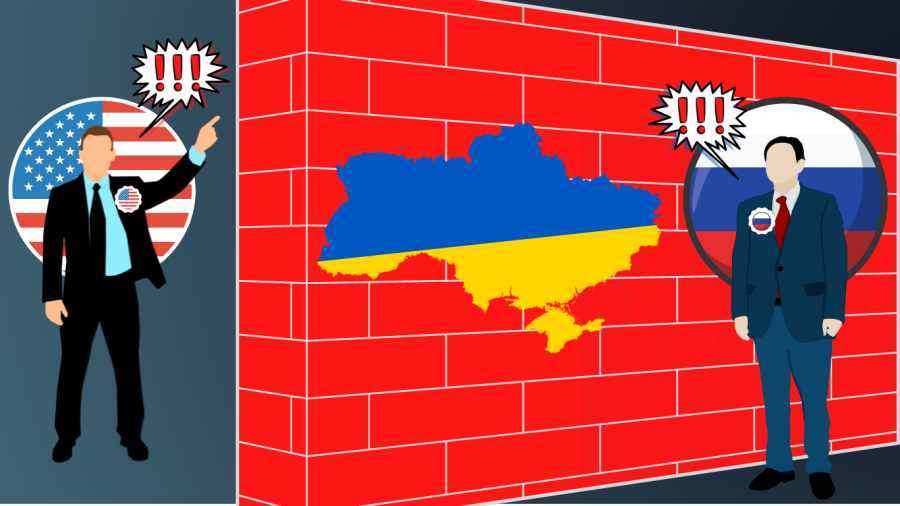OPINION: America must seek middle ground for Ukraine-Russia conflict
Neither side acknowledges demands of other, leading to increasing tension
With neither side listening to the other, negotiations are like arguing with a brick wall.
February 10, 2022
If you have been following world events recently, you may have heard that tensions are brewing between Ukraine and Russia over a variety of different issues. One of the major points of contention is moving Ukraine towards eventual North Atlantic Treaty Organization membership.
Despite the influx of news coverage surrounding the rising tensions, it feels easier than ever to get lost in the weeds or make some larger assumptions about the conflict.
Both the U.S. and Russia have sent out diplomatic feelers for negotiations, hoping to slow the military buildup before it reaches a boiling point. These talks have seemingly amounted to nothing as both sides poignantly ignore the main demands of the other.
John Preston, political science professor and independent consultant to the U.S. government, said that from President Vladimir Putin’s perspective Russia is being taken advantage of by the West.
“Russians felt they had an understanding with the U.S after the Cold War that NATO wouldn’t be expanded,” Preston said. “There has always been this policy concern about the creep of NATO towards Russia.”
This has been one of the largest sticking points of negotiation over the current conflict, as the U.S. has encouraged talks of Ukraine joining NATO while Russia has been seeking a guarantee to ban entrance into the American-led organization.
In theory, I could not agree with this more. Countries’ sovereignty is important to maintain in the face of larger countries attempting to bully them.
However, agreeing with the principle only and not asking the why or refusing to compromise is what is heating up this conflict.
“From Putin’s perspective, this is an incredible security threat,” Preston said. “It doesn’t matter that we aren’t intending to invade Russia. That’s not the position they are taking.”
There have been a number of pushes towards negotiations from both sides, though Putin has issued a number of large demands for both the U.S. and NATO. On top of excluding Ukraine from NATO membership, Putin has also called on NATO to move troops back from Russian border countries like Estonia and Poland.
“These are shoot-to-the-moon kind of demands,” Preston said. “This has led some State Department people to ask if Putin is setting this up to fail, giving them a justification to do whatever they want.”
This is certainly a possibility given the large troop movements from Russia near the Ukrainian border, as well as the annexation of the Crimean Peninsula in 2014. Despite this, it is important that we continue on with the intention of de-escalating the conflict and seeking a solution.
“It is key that policymakers understand Russian history,” Preston said. “Errors we make in policy stem a lot from not having a full appreciation of the Russian context.”
Understanding the full context of the situation is important both for news coverage and policymakers. Understandably, many news sources are derived from an American perspective and fail to capture the big questions relating to Russian history or politics.
As a country, we are used to mostly getting our way on the international stage. We have become increasingly adept and are used to making our demands in a situation sound like the only option.
We have made Russia’s demands to bar Ukraine from NATO sound utterly ridiculous, and this has cost us something dangerous in the process. By devaluing one of the major points of the Russian negotiations, we have failed to continually ask the important question of why it matters to Russia at all?
Should we back down? Should we bar Ukraine from NATO? At this point, it seems membership into NATO is far off, and Russia remains on edge despite this. We may need to meet in the middle in some places to gain true progress on the talks.
At the very least, it is hard to claim that we are helping the situation while also deploying more NATO forces to Eastern Europe in response to Russian troop movements and threatening the important Nord Stream 2 natural gas pipeline. While these actions are important for standing up to Russia, they are not moving toward cooling down the conflict.
The best-case scenario in my mind would be to sit down with Russian negotiators and pay attention to their concerns rather than ignore them. By acknowledging the “why” of the conversation, we can put together a plan of action that does not disqualify itself with nonsequiturs for both sides.
For instance, instead of completely barring Ukraine from NATO membership, we can grant both Ukraine and Russia an observer role within the organization. By giving Russia this access, we start to rebuild the lost trust and provide tangible and accessible evidence that the organization is not planning on aggressive action against Russia.
It seems unlikely that this approach will be taken, however. A strong stance on Russia is the Damocles Sword that the Biden administration has cursed themselves with, so it is likely they will follow through with it.
“Both sides have painted themselves into a corner,” Preston said. “It is very difficult for us to make the promises that Putin wants. Both sides are going to have trouble climbing down from their position.”
In a terrible paradox, the insistence on keeping the option open for Ukraine joining NATO is providing fuel for the fire in this conflict. Attempting to find a middle ground somewhere on this issue will be very difficult, but it also is the starting point for negotiations.
Despite the difficulties, despite the uncertainty from Putin, the U.S. should continue to push for de-escalation and negotiations. At least addressing the concerns of the Russians helps put us in the position of negotiating in good faith, which is a step in the right direction.
“While I think the U.S. should defend the peace here, U.S. involvement in things sometimes goes poorly,” said Tim Reidy, sophomore computer science major. “I think de-escalation should be the first option to try and work it out.”
This conflict is incredibly complex, and it would be an impossible task to fit it all in one article.
I encourage you to continue researching the intricacies of it as the situation progresses. Try to find a variety of sources to help establish the historical context and political foundation.
In the meantime, negotiations continue to trundle onward, and we can only hope for the best. I sincerely hope the situation will be resolved in a way that preserves the integrity of Ukraine and keeps its citizens safe.










